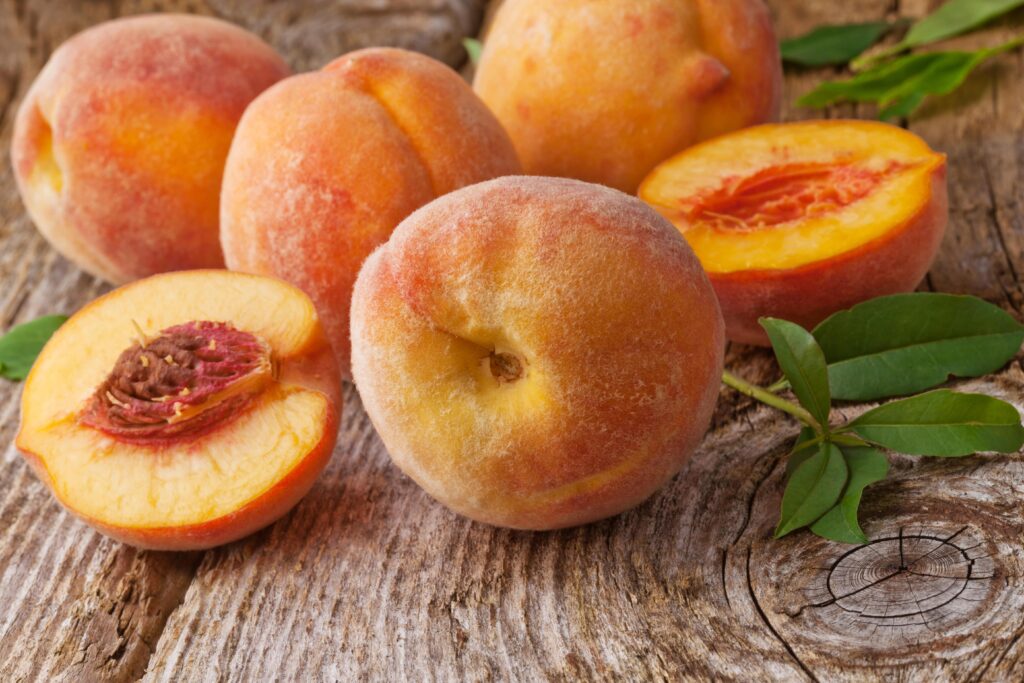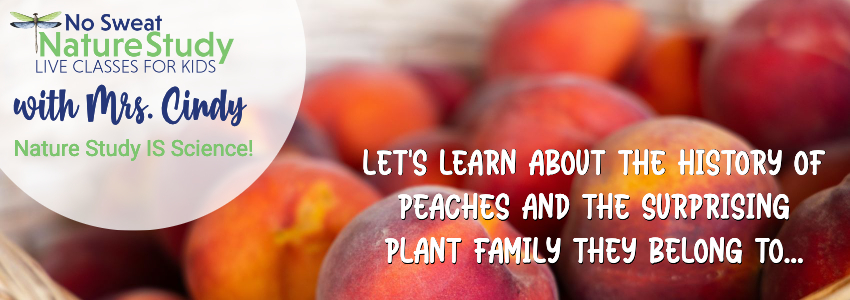Why Do Peaches Have Fuzzy Skin? Nature Study
This No Sweat Nature Study Podcast episode focuses on a fun peach nature study. Peaches are more than just sweet summer treats. Their soft, fuzzy skin holds fascinating science secrets that help them thrive outdoors.
Trichomes, tiny hair-like structures on peach skin, protect from pests, sun, and moisture loss. Such a small feature makes a big difference in how peaches grow and stay healthy.
The discussion also highlights other fruits like apples and grapes, and how they adapt to their environments. Listeners can look forward to the companion video class about peaches, which includes drawing, labeling, and comparing peaches and nectarines in even more detail.
Peach Nature Study
Here are some questions to ask your family to help with listening comprehension or spark fun discussions after listening to this episode about peach fuzz and fruit adaptations.
- What is the scientific word for the tiny, hair-like structures on peaches? (Answer: Trichomes.)
- How does the fuzz on a peach help it stay juicy? (Answer: It creates a barrier that slows down how quickly air can move and how easily water can escape.)
- What role does the fuzz play when it comes to rain and dew? (Answer: It blocks too much moisture from sticking to the skin, helping to prevent rot and disease.)
- How does the fuzz help protect peaches from the sun? (Answer: It reflects a bit of sunlight and helps regulate the fruit’s temperature.)
- Why don’t insects like crawling across the fuzzy peach skin? (Answer: The fuzzy hairs make it hard for them to move, acting like a forest of itchy bushes.)
- What is the main difference between a peach and a nectarine? (Answer: A mutation in a single gene keeps nectarines from growing trichomes.)
- Can you name some fruits with smooth skin? (Possible answers include: Apples, grapes, cherries.)
- How do apples and grapes protect themselves from losing moisture? (Answer: Apples have a waxy skin, and grapes have a thin waxy layer called a “bloom.”)

Peach Nature Study Video Class
The upcoming video class about peaches will build on everything from this podcast episode and turn it into a hands-on science adventure! By drawing and labeling the parts of a peach, creating a step-by-step life cycle diagram, and comparing fuzzy peaches to smooth nectarines, students will have the chance to learn in a hands-on and creative way.
This engaging class will help children build science skills and spark new questions about how fruits adapt and thrive. Families can enjoy the class live or catch the replay in the growing library of No Sweat Nature Study video lessons, which are designed to make nature study simple, fun, and accessible for all ages.

Nature Book Lists for Summer Reading
Here are some of Mrs. Cindy’s favorite nature-themed picture books and chapter books. Add these to your summer reading lists!
Would you like to record a voicemail to answer this season’s nature study question?
At the end of each No Sweat Nature Study Podcast episode, Mrs. Cindy includes messages from a few of her friends. You can record a message that she might use on an upcoming episode!
All children must have their parents’ permission before leaving a recording. Parents are welcome to record an answer, too!
Each season, there will be a different question to answer. You can see this season’s question below. Think about your answer first, and then follow these simple directions:
- Click the button that says “Start recording”.
- Tell me your first name. (If you want to tell your age and/or where you live, feel free to do that.)
- You will have 60 seconds to answer the question, but try to be concise.
- Push the play button to listen to your recording before sending it to be sure it is recorded correctly. If not, record it again.
Please leave a rating or a review on your podcast app! It helps the podcast to show up for more people…which means more families can enjoy science through the wonderful lens of nature study! Thank you!


